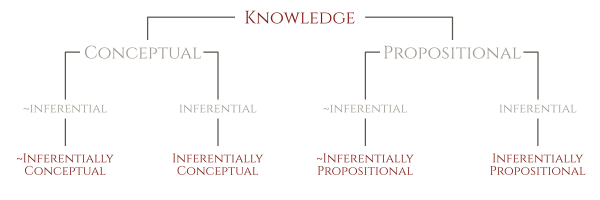﷽
Knowledge[1] is certain conviction that matches reality. Such that if one is certain that some belief is true, and this belief is actually true, then this belief is also knowledge.
Types of Knowledge
Knowledge is of two kinds: conceptual (Tasawur) and propositional (Tasdiq).
Conceptual: knowledge of a meaning. For example: knowledge of what “God” means. This known meaning is called a concept.
Propositional: knowledge of a relation between two concepts. For example: knowledge that “God exists”, where “existence” is related to “God”. The statement “God exists” is called a proposition.
Complexity of Knowledge
Each of conceptual and propositional knowledge is further divided into two sub-categories depending on the complexity of the known information: the non-inferential (Daruri), and the inferential (Nazari).
Non-inferential: information that does not require pondering to be known. For example: knowledge that “1 + 1 = 2”.
Inferential: information that does require pondering to be known. For example: knowledge that “14 × 6.5 = 91”.
The complexity of some information is subjective to the thinker[2]. Some facts may be non-inferential to some people, while being inferential to others. Some facts may even be inferential for one person at one time, and non-inferential for this same person at another time.

Non-inferentially conceptual: knowledge of a meaning that requires no pondering to be known. For example: knowledge of what “existence” means[3].
Inferentially conceptual: knowledge of a meaning that requires pondering to be known. For example: knowledge of what “quark” means.
Non-inferentially propositional: knowledge of a relation between two concepts, that requires no pondering to be known. For example: knowledge that “the whole of a body is larger than each of its parts”.
Inferentially propositional: knowledge of a relation between two concepts, that requires pondering to be known. For example: knowledge that “God exists”.
[1] By “knowledge” in this context, we mean human knowledge specifically.
[2] We say “some information” because some other facts are non-inferential for every Mukalaf, at all times. These fundamental facts are called “axioms” (Badihiyat). Such that all axioms are non-inferential, but not all non-inferential information is axiomatic.
For example: every Mukalaf knows that he himself exists.
The necessity of axioms is discussed here.
[3] In fact, the meaning of “existence” is so basic, its definition may even be ineffable. This is because one of the purposes of a definition is to explicate on what a word means by using simpler terms, and “existence” cannot be simplified any further.
How do you respond to the claim that these deductive processes you describe can only apply within the universe, they cannot be used to explain reality pre-universe or beyond the universe, because we have no knowledge of them to declare any premises about them?
As for nomic judgments, then they depend on experience, so we agree that one cannot infer that a proposition is true in all possible worlds just because it is nomically necessary.
For example: just because fire burns cotton in this world, doesn’t mean there can be no possible world where fire doesn’t burn cotton.
As for rational judgments, then they do not depend on experience. So whatever is true by rational necessity, is true no matter the possible world. And this is because rational judgments ultimately return to the fact that a thing is itself. Such that, if one were to predicate a quality to a subject, when this predicate conflicted with the subject’s essence, then either they’re lying, or they’re not referring to the same meaning we refer to when we speak about said subject.
For example: a triangle is a three sided shape by virtue of what it is. So if someone claimed that they saw a triangle that is not three sided (whether they claim to have seen it in this universe or another, doesn’t matter), then either: they’re lying (because as soon as a shape is determined to be not three sided, then this shape is determined to be not a triangle), or they mean by “triangle” something other than what everyone else means when they say “triangle” (in which case, there is no problem unless equivocation occurs. Because in such discussions, we care about meanings more than we care about the words used to express them).